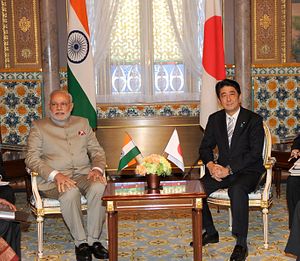With the successful conclusion of the Indo-Japan civil nuclear deal, India has taken another big step in acquiring the status of a legitimate nuclear power among states of equal or higher status in the global stage. India’s drive toward acceding into this elite club started long before the Nuclear Suppliers Group was even conceived. Even as India proclaimed its independent opinions while rejecting membership to the Non-Proliferation Treaty (NPT), it has made significant attempts to gain access to greater nuclear resources and has forged numerous strategic deals with both archetypal great powers as well newly developing states. With such a mandate, India’s global status has received wider recognition from not only individual nation-states, such as lately the Japanese government, but also at international forums, as revealed through the waiver India received from the Nuclear Suppliers Group in 2008.
The India-Japan partnership can be traced to the very start of this century, as Yoshiro Mori’s meeting with Atal Bihari Vajpayee laid the foundation of a global partnership between these two states. In 2006, India and Japan established a stronger strategic and global partnership during Manmohan Singh’s visit to Japan. These two nations have accepted each other as true partners. This has been highlighted with a huge leap in the form of the historic nuclear deal signed during Prime Minister Narendra Modi’s recent trip to Japan. While negotiations started in 2010, the non-NPT status of India was a stumbling block, which now has been surpassed to forge this deal between India and Japan.
This nuclear pact speaks of much more than just the friendship and strategic partnership between these two countries. The deal is also an indirect attempt to influence India’s struggle for full-fledged membership at the Nuclear Suppliers Group, as well as a step closer toward a global status based upon India’s distinctiveness.
Though many concede security to be the prima facie reason driving these two nations toward more collaborative efforts, status and legitimate international recognition on the global stage remains a major factor to reckon with in their calculations. Status is appropriated in relation to a group of states or the dominant state in the global realm and is therefore country-specific. Further, status has an innate demand for legitimacy, lest it add no positive value to the overall standing of a state. And such legitimacy is acquired prominently through inclusion into international institutions of high legitimacy and recognition as well as by forging exceptional deals with major global players.
For instance, India’s waiver from the NSG had an inevitable impact on India’s status, which has, on the flip side, fueled greater suspicion between India and China. For instance, in the aftermath of the NSG waiver granted to India in 2008, China aimed at blocking a $2.9 billion loan to India from the Asian Development Bank on the pretext that China is responsible for development in Arunachal Pradesh. Thus, the security dilemma is interwoven with status perceptions.
With the Indo-Japan nuclear pact ultimately having reached its conclusion, it brings along a positive status acclamation for India as a responsible nuclear power. As China persists in being a permanent irritant to India’s quest for full-fledged membership at the NSG, on the pretext of India not having fulfilled the NPT criteria, the Indo-Japan nuclear pact emphasizes the distinctive position that over the years India has achieved in the global realm. As noted through China’s reluctant affirmation of Japan’s engagement with India, New Delhi’s drive toward the NSG’s elite club now is not too distant a reality.
As Philip Nel puts it, recognition “is the communicative process in the international society of states through which states mutually acknowledge the status and esteem of other states.” India’s waiver at the NSG was conferred as a covert recognition of India’s de facto nuclear state status. Similarly, with the Japan-India nuclear deal, India’s nuclear state status has gained significant legitimacy not just among Japan’s allies but also in the international realm, as India is the only non-NPT signatory to have concluded such a deal with Japan.
However, India’s end route to thte NSG’s high table cannot be a smooth ride, thanks to a huge hindrance in the form of China-backed Pakistan. As China remains insistent on the criteria-based inclusion of non-NPT members, furthering Pakistan’s case at the NSG, the near future is sure to witness more frequent diplomatic negotiations between China and India on the issue. India, having the support of Japan, needs to strategically calibrate its stance such as to maximize its chances at the NSG. In order to successfully to do so, status needs to be taken into consideration alongside security concerns.
The security dilemma between India and China is affected by and influences the status dilemma. For instance, China’s multiple incursions into the disputed territory of Arunachal Pradesh have been a signal to India of China’s growing anxiety over territorial integrity. A territorial dispute is to a great extent a manifestation of one state’s perception of another state versus its self perception, as reflected in the case of India and China. In other words, when a status dilemma arises, territorial disputes are likely to flare.
Now, with India moving closer to Japan, the status dilemma might further intensify between these two states. However, despite these expected complications, the Indo-Japan nuclear deal has undoubtedly added another feather into the hats of those engaged in diplomatic maneuvering for the past few years. It will inevitably have a positive impact on India’s status, as construed through international legitimacy and recognition.
Baisali Mohanty is a regular contributor to Forbes, OpenDemocracy, Mainstream, UN Post, and other publications. She has a postgraduate degree in South Asian Studies with International Relations from the University of Oxford.

































